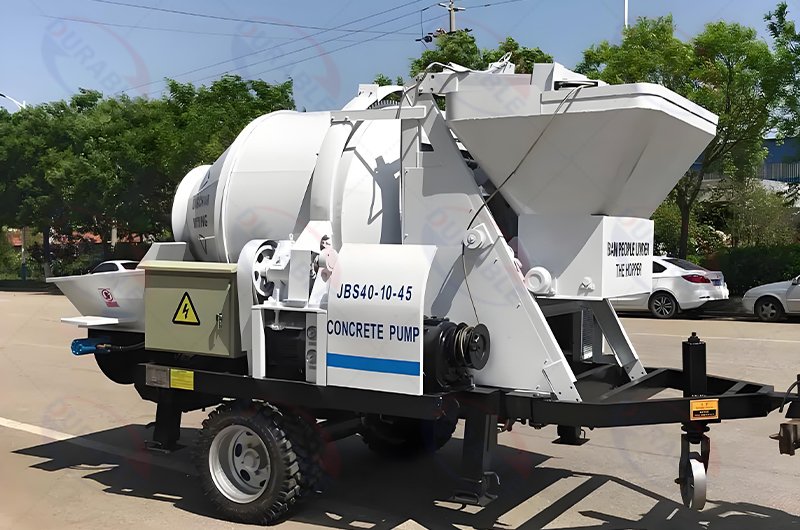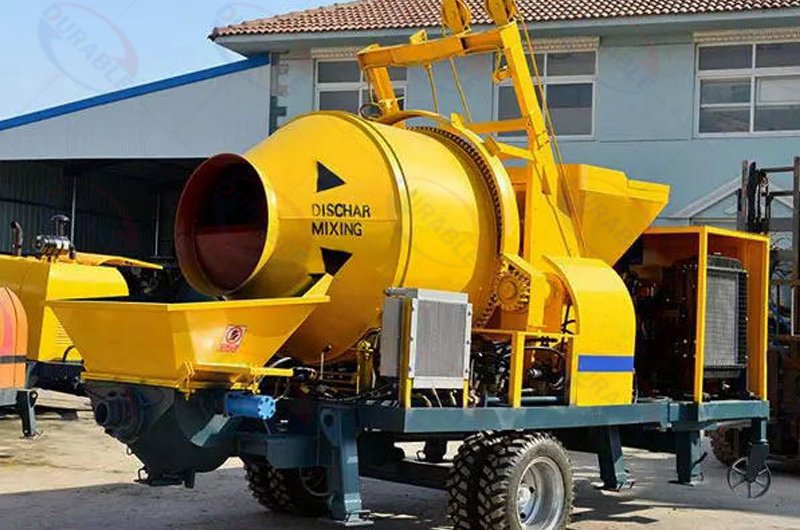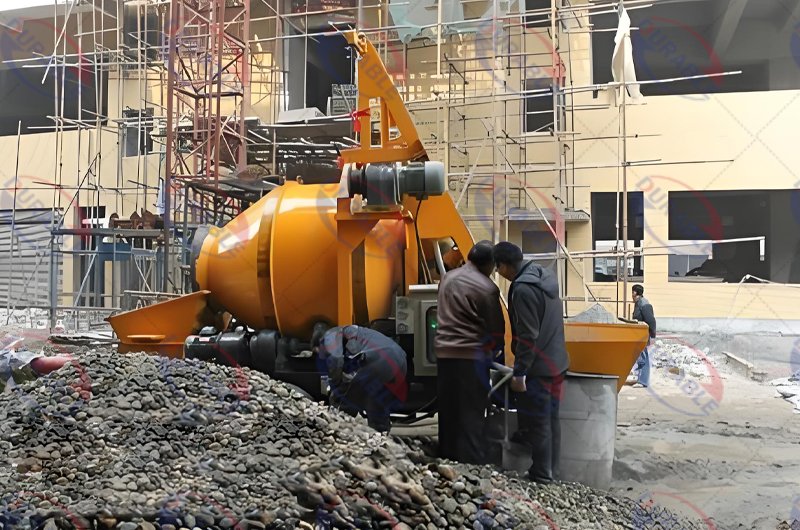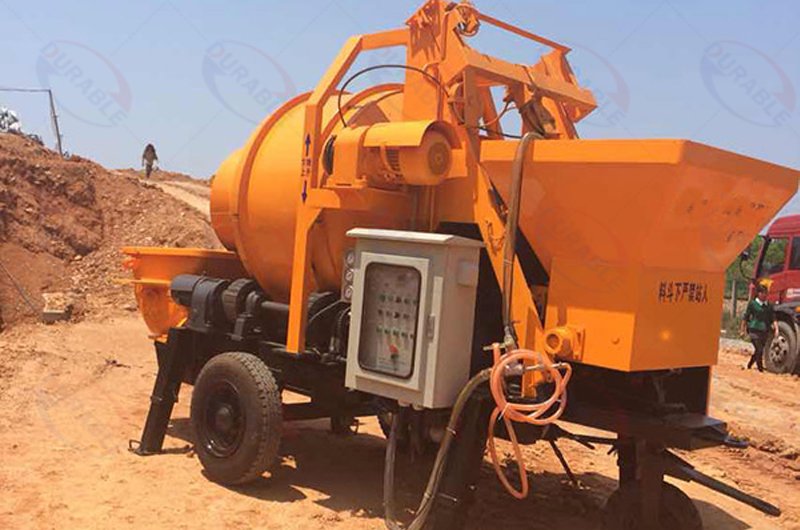Electric vs. Diesel Concrete Mixer Pump: Which to Choose?
As a manufacturer with over two decades of experience, we know that choosing the right equipment is a critical business decision. When it comes to the electric concrete mixer pump versus the diesel concrete mixer pump, the choice is not just about the power source. This single decision affects your daily operating expenses, your project timeline, your compliance with regulations, and your overall profitability. The wrong choice can lead to inefficiency, frustration, and lost money.


This guide will give you a clear, honest comparison to help you with your construction equipment selection. We will look at the long-term construction project cost implications of each option. We will help you understand which pump, the electric vs. diesel pump, is the right tool for your specific job demands, ensuring you get the best return on your investment.
Table of Contents
- Long-Term Costs: Electric or Diesel Pump?
- Remote Sites and Unstable Power: Diesel Only?
- Urban Sites & Strict Regulations?
- Maintenance and Convenience: Which is Easier?
- Power and Pumping Efficiency: Is There a Gap?
- Common Questions About Concrete Mixer Pumps
- Summary: The Right Tool for the Right Job
- About Durable
- Get a Quote for Your Next Pump
Long-Term Costs: Electric or Diesel Pump?


Over the long term, an electric concrete mixer pump is significantly cheaper to operate and maintain than a diesel model. When you look beyond the initial concrete pump price, the daily running costs are where you will see the biggest difference. The cost of electricity per cubic meter of concrete pumped is much lower and more stable than the price of diesel fuel. For a contractor working on long-term projects, these fuel savings alone can add up to thousands of dollars over the life of the machine, dramatically improving your return on investment (ROI).
Maintenance is another major factor in the total cost of ownership. A diesel concrete mixer pump has a complex internal combustion engine. It requires regular oil changes, fuel filter replacements, air filter cleaning, and cooling system checks. These tasks require downtime and continuous spending on parts and labor. In contrast, an industrial electric motor has very few moving parts. Maintenance is simple, usually just involving checking connections and basic lubrication. This means more uptime for the electric pump and far fewer surprise repair bills. For any business focused on minimizing long-term construction project costs, the electric option presents a clear financial advantage in both fuel and upkeep.
Remote Sites and Unstable Power: Diesel Only?


Yes, for projects in remote areas or sites with no reliable electricity, the diesel concrete mixer pump is your only practical choice. This is the number one advantage of the diesel model: complete freedom and self-sufficiency. A diesel pump is its own power plant. You can tow it to a new housing development miles from the grid, a remote bridge repair, or a highway construction project and start pumping concrete immediately. You are never limited by the site’s infrastructure. There are no power cables to worry about, no need to check for three-phase power availability, and no need to rent a separate, expensive generator to power your equipment.
While you technically can power an electric concrete mixer pump with a large generator, this often defeats the purpose. A generator adds significant cost, noise, emissions, and another engine to fuel and maintain. It essentially turns your clean, quiet electric pump into a loud, two-part diesel system. Therefore, if your work frequently takes you to locations with poor or non-existent construction site electricity, the diesel pump is the clear winner. It provides the unmatched mobility and operational independence needed to get the job done anywhere, anytime. Its reliability in off-grid situations is why it remains a workhorse for civil engineering and new infrastructure projects.
Urban Sites & Strict Regulations?
For projects in cities or areas with strict environmental rules, the electric concrete mixer pump is the superior and often mandatory choice. The biggest downsides of a diesel engine are its noise and exhaust fumes. Diesel pumps are extremely loud, which can lead to noise complaints from neighbors and force you to limit your working hours, causing project delays. More importantly, cities around the world are implementing stricter diesel engine emission standards, such as Tier 4 Final. These regulations make diesel engines more complex and expensive to buy and maintain. Using a non-compliant diesel pump in these areas can result in heavy fines.
The electric pump solves all of these problems. It operates with very little noise, making it the perfect “good neighbor” for residential projects or work near hospitals and schools. It produces zero on-site emissions, making it the only safe and responsible choice for indoor work, tunneling, basement construction, and any poorly ventilated space. Using an electric pump creates a healthier environment for your crew and ensures you will have no trouble with environmental inspectors. As urban construction becomes more regulated, the electric concrete mixer pump is not just a preference; it is becoming a necessity for contractors who want to work in these profitable markets without issue.
Maintenance and Convenience: Which is Easier?
An electric pump is far easier and less expensive to maintain, making it the more convenient option for busy contractors. The difference in concrete pump maintenance requirements is stark. A diesel engine is a complex machine with hundreds of moving parts that are subject to wear and tear. Your daily checklist includes checking oil levels, coolant, and fuel. Your regular maintenance schedule is filled with tasks like changing the oil and filters, servicing the fuel injection system, and monitoring the exhaust treatment system. This all takes time, costs money, and requires a skilled mechanic. Any downtime for maintenance is a day you are not earning money with your machine.
In contrast, a heavy-duty electric motor is incredibly simple and reliable. There is no oil to change, no fuel system to clog, and no radiator to leak. Maintenance is minimal and straightforward, often limited to checking electrical connections for tightness and ensuring the motor bearings are lubricated according to the manufacturer’s schedule. This simplicity means significantly more uptime and fewer unexpected breakdowns. For a business owner, this means peace of mind and a more predictable operational budget. The electric pump is always ready to work when you are, without the constant need for attention that a diesel engine demands.
Power and Pumping Efficiency: Is There a Gap?
While diesel engines are known for high torque, a correctly sized electric pump provides more than enough power for the vast majority of concrete pumping jobs. Many contractors believe that diesel is inherently more powerful, but this is a common misconception. It is true that diesel engines excel at producing high torque at low RPMs, which can be an advantage when pumping extremely harsh, low-slump concrete mixes over very long distances. This makes them a frequent choice for massive civil engineering projects. However, for the typical applications that make up 90% of construction work—foundations, slabs, and mid-rise buildings—an electric pump is just as effective.
Modern electric concrete mixer pump models like our Durable concrete mixer pump are equipped with powerful, high-efficiency motors designed specifically for the demands of pumping concrete. They deliver consistent pressure and a steady flow rate, ensuring a high-quality pour every time. The key is to match the motor’s power (in kilowatts) to your specific needs. When properly sized, an electric pump can handle challenging mixes and vertical pumping with ease. The real-world performance difference for most contractors is negligible, making the electric pump’s other benefits—lower cost, less noise, and zero emissions—even more compelling.
A Quick Checklist to Help You Decide
Use this simple table to determine which pump is the right fit for your business. The right choice depends entirely on the type of work you do most often.
| Factor | Choose a DIESEL Concrete Mixer Pump If… | Choose an ELECTRIC Concrete Mixer Pump If… |
|---|---|---|
| Project Location | You work on remote, rural, or undeveloped sites. | You work in dense cities, residential areas, or indoors. |
| Power Availability | There is no reliable 3-phase power on-site. | A stable, high-voltage power source is readily available. |
| Environmental Rules | Noise and emission regulations are not a major concern. | You must comply with strict noise and air quality rules. |
| Mobility Needs | You move the pump between different job sites frequently. | The pump will stay in one place for weeks or months. |
| Your Budget Priority | Upfront flexibility is more important than long-term costs. | Minimizing long-term fuel and maintenance costs is key. |
| Typical Project Type | New infrastructure, short-term jobs, varied locations. | High-rise buildings, precast factories, long-term urban projects. |
Common Questions About Concrete Mixer Pumps
Question 1: What is the main price difference between electric and diesel pumps?
A: Typically, a diesel concrete mixer pump has a higher upfront purchase price because the diesel engine and its related systems (cooling, exhaust) are more complex and expensive to manufacture than an electric motor.
Question 2: Which is better if I need a small concrete pump?
A: For small concrete pump applications like residential patios or repair work, an electric pump is often ideal. It is quieter, produces no fumes, and is less disruptive in neighborhoods. If the small jobs are in remote locations, a small diesel pump would be necessary.
Question 3: Can I run a whole construction site on a generator?
A: While possible, running a whole site, including a large electric pump, on a generator is very expensive. It requires a very large, powerful generator, which consumes a lot of diesel fuel and negates the cost and environmental benefits of choosing an electric pump.
Summary: The Right Tool for the Right Job
The electric vs. diesel pump debate does not have one simple winner. The best choice is the one that aligns with your business model. The diesel concrete mixer pump is the versatile, self-reliant workhorse, offering absolute freedom for contractors who work in a wide variety of locations, especially off-grid. The electric concrete mixer pump is the smart, efficient specialist, delivering significant long-term savings on operating and maintenance costs for contractors working in established urban areas or on long-term, static sites. By carefully evaluating your projects, you can select the machine that will be a profitable asset for years to come.
About Durable
Since 2001, Durable has been a leading manufacturer of construction equipment, providing reliable and efficient solutions to contractors in over 120 countries. We specialize in a complete range of concrete machinery, including both electric and diesel mixer pumps, batching plants, and self-loading mixers. Our factory-direct model ensures you receive high-quality, robust equipment at a competitive price, backed by our expert engineering support.
Get a Quote for Your Next Pump
Are you ready to invest in a machine that will boost your efficiency and profitability? Contact our team today. We will listen to your needs, analyze your project types, and provide a detailed quote on the electric or diesel concrete mixer pump that is perfect for your business. Let us help you make the right choice.
 Durable Machinery
Durable Machinery